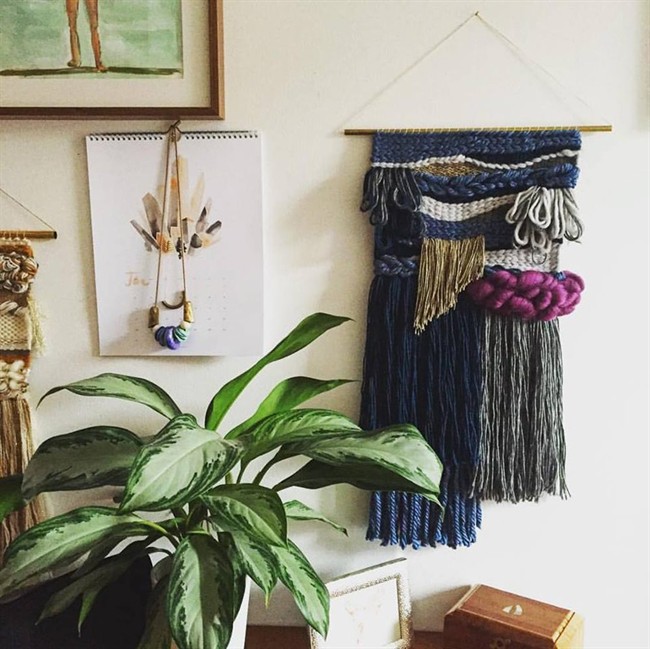Women have always been an integral part of crafting culture, and now, with help from the internet, they’re at the forefront of the current “maker” movement around the world.

Hobbies can become thriving sidelines or full-time livelihoods. At Etsy.com, a major online crafts marketplace that launched in Brooklyn in 2005, most of the sellers are women, says Heather Jassy, a senior vice-president for the site. She says women make up 86 per cent of the site’s sellers in America, 94 per cent in Australia and 91 per cent in Canada, for example.
“We hear from our sellers that they want to make a life, not just a living,” she says. “Starting a creative business gives many women the opportunity not just to follow their passion, but to retain their autonomy, and build flexibility into their lives.”
Greta de Parry of Chicago grew up on her dad’s construction sites, poring over blueprints.
“I always knew I’d follow some kind of creative path,” she says. “I just didn’t know what.” In a first-year woodworking class at the Art Institute of Chicago, she fell in love with furniture making.
“It felt so natural to me, I didn’t think twice about it.”
She started her own line of custom pieces in 2009, and in 2014 opened an Etsy shop. Among her works are geometric stools, bar carts and bread boards made of hand-cast concrete, powder-coated steel and locally sourced hardwood. Last year, she won an award at Dwell on Design in Los Angeles for her Coleman steel stool.

Get daily National news
Evan Gray Gregory of Seattle, who used to design displays at Macy’s, turned her interest in woodworking into a business when she came up with a clever fix for a common problem. She’d gotten a new cat, and decided that a standard, pet-store litter box wasn’t going to work.
“I couldn’t find anything out there to blend with our collection of midcentury modern pieces,” she said.
She designed and built a stylish litter box that drew raves from friends, and she opened Modernist Cat on Etsy in 2010. The line now includes walnut- and maple-finished crates, elevated bowls, and consoles that combine a storage shelf with a scratching pad, all designed with a midcentury modern flair.
Amelia McDonell-Parry, Spin Media’s editor-at-large and an amateur weaver, says Instagram has become a powerful player.
“Over the last few years, a community of mostly female creators has exploded on the app, including both professional makers and on-the-side hobbyists, many of whom have seen sales grow along with their follower accounts,” she says.
She posts pictures of her textile pieces. “I’ve built up the majority of what following I have through Instagram, where makers are super-vocal about supporting each other’s work and celebrating each other’s achievements, whether it’s launching a collection with a cool local shop, or hitting a milestone in terms of followers or sales, or learning a new skill,” she says.
Home-decor trends favouring handmade and bespoke goods have helped turn furniture, woodwork, ceramics, and fiber arts like macramé and weaving into some of the biggest growth areas on Etsy, says the site’s merchandising manager, Emily Bidwell.
In some countries, talented craftswomen are doing more than pursuing personal creative paths: They’re helping bring income to their communities.
Norlha Textiles, a textile-making atelier, is perched high on a Tibetan plateau. It was started by Kim Yechi, an American expatriate married to a Tibetan. Nomadic women design, produce and sell textiles made from khullu, the soft under-fur of the yak. The luxurious material, similar to cashmere, has been turned into runway collections at Lanvin and Balmain, and finished goods are also sold on the atelier’s website.
In the small Nicaraguan coastal town of El Cerro, the Oyanca collective of more than 25 women weave pine needles with threads and ribbons into colorful boxes, baskets and accessories. They’ve been aided by several international product designers who’ve helped them come up with items that will appeal to the contemporary craft market.
And in El Salvador, the mountain town of Comasagua was devastated by an earthquake and mudslides in 2001. In 2003, a local architect named Ana Rosa Graf started Arte Comasagua, where women artists create cards using wildflowers and grasses. For many, the income generated by their artwork helps pay for their families’ food, housing and medical care.





Comments
Want to discuss? Please read our Commenting Policy first.